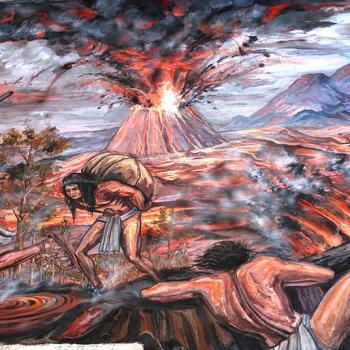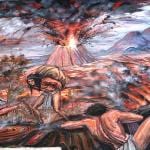
You may have heard the popular story about the turtles. It’s said that somebody — I’ve heard that it was a woman, or a man from India; most probably, it was either Elvis or Solomon Spalding — explained that the universe rests on the back of a giant turtle. “But,” one skeptic objects, “what does the turtle rest on?” “Oh,” responds the turtle-theorist, “you can’t trick me! It’s turtles all the way down!”
This is often taken as an objection to theistic explanations for the universe. Does the universe owe its existence to God? Yes? Well, then, who created God?
Keep that little anecdote in mind as you read this passage from Keith Ward, Why There Almost Certainly Is a God: Doubting Dawkins (Oxford: Lion, 2008), 54-55:
Can we think of something that could not fail to exist, that would be necessary? Modern cosmology suggests one possibility. Some cosmologists suggest that we live, not in a universe, one space-time, but in a multiverse, in which there are many space-times. Some argue that if you had a huge multiverse in which every possible combination of laws and constants was realized, then this universe would no longer be improbable. It would be certain — it is bound to exist somewhere in the multiverse.
Though it is very controversial, this hypothesis — the extreme multiverse hypothesis — would be a final explanation of the universe, since it would make the existence of our universe virtually certain. What it requires is that every possible universe exists. And that might be necessary — there might be no alternative to it. There are no other universes to think about, since all of them are in the set of ‘all possible universes’. And that set has to be what it is, since if any universe is ever possible, then it is always possible, it always was possible and it always will be.
Possibilities, we might say, are eternal. They cannot come into being or pass away. They cannot be caused or brought about. If they are, they are, and if they are not, they are not. And that is that.
I suppose you could say that there might have been no possibilities at all. But in that case, nothing would ever exist, since there would be no possibility of anything existing. And if something is possible, then that possibility just is not the sort of thing that can come about, or that can be brought into being.
So the answer to the question, ‘What made the set of all possible universes exist?’, is that such a set is not the sort of thing that can be brought into being. It either always is or it never is. And, since there actually is something — because we are here — it obviously always is.
If you follow this train of thought, the turtle objection has already lost its main force. We can think of something that is not capable of being brought into being, that either always is or never could be. We have already made the distinction between the eternal (that which cannot be brought about) and the temporal (that which is in time, and so begins in time, and so needs a cause). Now we can make a distinction between the contingent (that which could be otherwise) and the necessary (to which there is no alternative). And we have seen that any final explanation for the universe will have to be both necessary and eternal, and so it cannot possibly be caused.
***
Sean Carroll, a physicist at Caltech (and an atheist), takes a different position than does Professor Ward:
“Why Is There Something, Rather Than Nothing?”
***
In the meantime, you might enjoy this:












